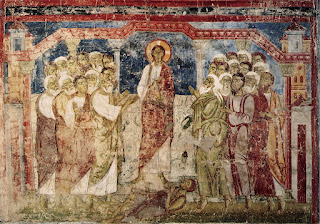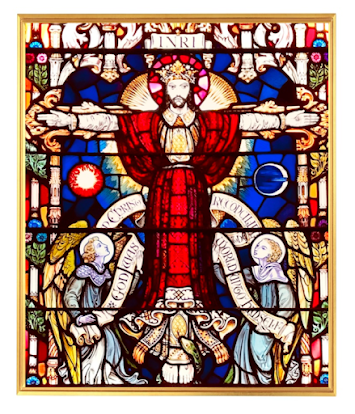Matthew
13:31-33, 44-52: Five Parables of the Kingdom
This week’s Gospel lesson is a whole boatload
of parables about the Kingdom of Heaven, something Jesus talked a lot about but
never described in plain words. He told little stories and vignettes about what
it was like, stories that may seem simple on first reading, but the more you
think about them, the less obvious their meaning becomes. If there’s one thing
these particular parables have in common, it may be the idea that the Kingdom
of Heaven is something that requires patience.
The word “parable” literally means
putting one thing beside another. It’s not as clearly defined as an allegory,
in which every image has a direct, one-to-one symbolic meaning. Parables simply
set two ideas in juxtaposition and let the listener sort out the similarities.
The earliest versions we have of most of the parables of Jesus do not include explanations; these were likely added by later editors in the communities where the Gospels grew into their final forms. All these parables have unexpected elements in them that at once deepen, illuminate, and confound our understanding of what the Kingdom of Heaven looks like. So I want to look at these parables, try to ignore the explanations, ask a few questions, and see where that takes us.
Let’s start with the mustard seed. I’ve
brought some Middle Eastern mustard seeds in this little jar. I’ll pass it
around. You’ll notice they’re not like the ones we find in the spice aisle at
Market Basket. They are really, really tiny, so small that if I were to take
one out of the jar onto my finger and exhale, it would fly away and be
impossible to find again until it sprouted. They’re smaller than a period on
this page of 12 point type. And they’re the color of dirt. Sow them outside, and
you can’t distinguish them from the grains of soil around them until they
sprout.
I have also printed a picture of the
kind of plant this mustard seed grows into, at least according to Google. It
spreads and towers, definitely big enough for many birds’ nests. They say an
average mustard bush is at least the size of the massive rhododendron in my
back yard, which is probably a good 15 feet tall. Sometimes it gets taller than
a palm tree. Several commentators I read said that the mustard tree in Israel
is actually considered kind of a weed. It can be invasive and take over a
garden.
I wonder how the Kingdom of Heaven is
like a tiny seed, or for that matter, like an invasive shrub. How does it
start? What makes it grow? What power is this that’s in a seed? I know it
doesn’t happen right away. Growing anything that size takes time.
The parable of the yeast is very
similar to the mustard seed, in that it starts small and gets bigger, but with
an important difference. The yeast itself doesn’t grow into a plant, it causes
the dough it’s in to grow and rise through its exhalations of CO2.
I’ve taught this parable to children
as a kind of science experiment. The kids mix three quarter-cup measures of
flour (into which, I will confess, a little sugar has been blended to
accelerate the result), and they add ¼ teaspoon of yeast with some water, stir
it, and set the bowl aside under a warm lamp. They come back at the end of the
class to see what happened to it. They’re surprised to find that, with the
passage of time, what was a small lump of dough is about ready to overflow the
bowl.
According to my Oxford Annotated
Bible, the leavening referred to in the parable to is more like a sourdough
starter than the quick-rising dry yeast we get at the store. Traditional
sourdough catches wild yeast from the air and propagates it, feeding it
carbohydrates and creating carbon dioxide bubbles. Once the yeast is captured,
you can use a bit of that same starter for each subsequent loaf, and the leaven
continues to spread.
Making bread that way takes time and
patience, just like growing a tree from a seed. Leaven permeates quietly, gradually
changing the chemical composition of the bread. What chemical reaction is the Kingdom
of Heaven causing in us? In the world? How are we being changed?
The next two parables are very
similar to each other also. In one, a merchant finds a valuable pearl, and in
the other a man finds a treasure randomly buried in a field. They used to do
that in the time before bank vaults and the FDIC. They’d put their valuables in
a clay pot and bury it like kimchee somewhere on the property. If a burial
location wasn’t well documented, the treasure could be lost for a while until
someone (like maybe a farm worker) came along and found it by accident. By law,
whoever owned the land would own the contents of the pot, so to get the
treasure, our worker has to buy the field, and it takes all his life savings. I
expect it took him some time to sell everything and gather up the money. The Kingdom
of Heaven is compared to this situation. It seems straightforward, right? The
Kingdom is a treasure for which we give should everything else up. Well, maybe.
But then there’s the merchant looking
for pearls. Again, he sells everything in order to buy this one special pearl. Like
the man who finds the treasure, the merchant is surprised by his discovery,
just as the children are surprised by the risen dough. The two stories are
often read as if they were identical in meaning. But there’s one important
difference in the text. The buried treasure is directly compared to the Kingdom
of Heaven. But not the pearl.
The text doesn’t say the Kingdom of
Heaven is like a pearl. It says the Kingdom is like a merchant looking for
pearls. I wonder what the pearl is, then, if it’s not the Kingdom of Heaven? Who
or what is the merchant? One reading has it that the merchant is Christ, who
gave up everything for us, and the pearl is us. I like that interpretation, but
are there other ways we could read it? What about the Kingdom is a surprise?
The fishnet parable seems to be the
odd one in this Lectionary grouping. It bears similarity to one that precedes
this passage, that of the weeds among the wheat that we heard last week. Like
with those weeds from last week, the good and bad fish are gathered in together
and separated later. The weeds will be burned, and the “bad” fish will be
thrown out. And of course there will be weeping and gnashing of teeth for those
bad fish. What makes a fish bad, I wonder?
The interpretation given here as if by
Jesus probably wasn’t there originally. So maybe the bad fish equal bad people,
as the explanation goes, but can we play with it a bit? How is the Kingdom of
Heaven similar to a net full of every kind of fish? How many kinds of fish are there
in the Kingdom? Are there guppies? Are there Squid? Are there sharks?
I was thinking how nowadays fishermen
have quotas of certain kinds of fish, and after they meet the quota they have
to throw them back, even if they’re otherwise perfectly good fish, so that the
species can continue. A fish might also be thrown back if it’s too small, so it
has the chance to keep growing. I like to picture Jesus’ metaphorical fishermen
tossing the small fry back into the Sea of Galilee. Because maybe no one is
irretrievably evil? Maybe they’re just not ready yet? Could the whole thing be
about mercy?
Growing a tree from a small seed
takes time, but the life is there all along in that tiny package. The whole
plant is hidden inside it, waiting quietly to burst forth and eventually
overwhelm its surroundings. Baking bread using wild yeast takes a lot of
patience. So does sorting a large net full of fish. And I wonder how long the
merchant searched to finally find that one pearl of great value. How many
oysters did he have to pry open? And how long did it take to close the deal on
that piece of real estate with the treasure in it? Maybe these parables
demonstrate the patience of God, or maybe Jesus is reminding us that, although
the coming of the Kingdom of Heaven is as inevitable as bread rising, it may
not come all at once. It comes with small starts, painstaking processes, and
sometimes very long waits, but it comes. Surely it comes.



Comments
Post a Comment